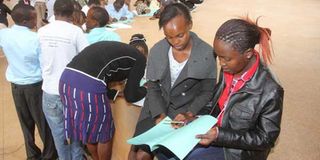Attack on Garissa college has made life at Moi University more difficult

Students who survived the Garissa University College attack register at Moi University in Eldoret. PHOTO | JARED NYATAYA | NATION MEDIA GROUP
What you need to know:
- But it is nonetheless true; before April 2, I did not feel a real connection to Garissa University College.
- The most obvious of the several things that have happened in the wake of that last decision is that security has been enhanced in Moi University.
- Details on how to settle the incoming group of traumatised Garissa University College students comfortably in Moi University are being worked out.
- The capacity of the university to offer counselling services is being increased.
Before April 2, 2015, Garissa University College was just one among several Moi University outposts.
I know that does not sound right coming from a Moi University Senator.
After all, the Moi University Senate oversees the academic affairs of Garissa University College.
It is the navel at which Moi University and the otherwise autonomous Garissa University College are joined.
And so I should know better; and I do.
But it is nonetheless true; before April 2, I did not feel a real connection to Garissa University College.
This explains why I did not give a thought to a general invitation that was extended to those who qualify to be academic leaders to go to Garissa to help give the university college direction.
The invitation was sent out in a meeting of the Moi University Senate that was held a few months before the fateful day. I accepted the argument that it was necessary that senior academics should go to Garissa University College for an academic year or two to assist the institution to get to its feet.
It just did not occur to me that I should be the one to go. Indeed, I have never been to Garissa University College.
SECURITY FORCES
That has nothing to do with a perception of Garissa town, where the university college is located, as not being part of Kenya. I have family in Garissa.
They have been there for well over two decades. I have never felt that they are in some foreign, or even distant and inaccessible place.
As is to be expected, I have visited with my family.
Yes, I have never been blind to the fact that the presence of security forces is more in Garissa town than in, say, Ugunja, where I have my home.
So, even though my initial reaction to the news that I heard on the BBC as I drove to the Main Campus of Moi University on the morning of April 2 that Garissa University College was under terrorist attack was one of indignation, my immediate concern was for the security and well-being of my family.
My reaction was quickly modified once I got to the office as conversations on the unfolding tragedy attached the faces of fellow senators, those who work in the university college, to the abstract idea of people in the institution whose lives were in danger.
In the days following April 2, circulating information about the attack and responses to it – whether the information took the form of government statement, report to the Moi University Senate, news reports, political commentary, private family communication or rumour — kept Garissa University College constantly in my view.
Along these lines there was, at the same time, a Special Meeting of the Moi University Senate that besides formalising the closure of Garissa University College spelt out the immediate way forward for the surviving students of the institution.
It is this meeting that determined that the students are to complete their interrupted semester from the Main Campus of Moi University.
SECURITY CHECKS
The most obvious of the several things that have happened in the wake of that last decision is that security has been enhanced in Moi University.
The security checks at the university’s main gate are now very thorough.
We even have the boots of our cars checked as we enter campus. There is an obvious increased police presence.
It is no longer rare to see pairs of armed policemen in uniform strolling about.
I am told there are many more police officers in civilian clothes, and that we may soon have a police station on campus.
Whereas I see the point behind all of this I also know that sooner rather than later serious questions on academic freedom will need to be raised and addressed in the light of these developments.
Will it be possible to carry out serious sociological inquiry into the phenomenon known as Al-Shabaab and disseminate one’s findings at Moi University without rousing the unwelcome interest of the security forces in these circumstances?
These issues are bigger than Garissa University College and Moi University. The new global security challenges compel the academy to engage in serious self-introspection.
More immediately, the details on how to settle the incoming group of traumatised Garissa University College students comfortably in Moi University are being worked out.
Hostel rooms and classrooms are somehow being made available.
The capacity of the university to offer counselling services is being increased.
My awareness of these processes is, of course, heightened by my status as a Moi University Senator.
In a sense, the events of April 2 have to my mind, and physically, relocated the outpost that was Garissa University College into the metropole that is Moi University.
Prof T. Michael Mboya teaches at Moi University, Eldoret and is also a member of the University Senate





